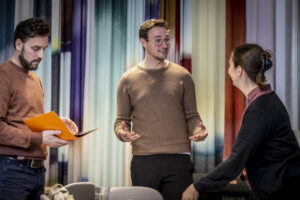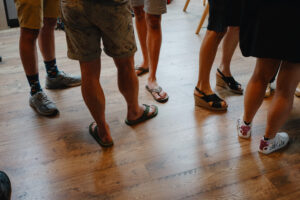Parents teaching their own kids, students taking their classes via Zoom, restaurants switching to take-away almost overnight, retail stores selling their products via Instagram, … It’s undeniable that Covid-19 caused an accelerated transformation in the way we work, going much further than making remote work the new standard.
Undeniable, but not unexpected, since the way we work was already changing even before the pandemic broke out. With the rise of machine intelligence and our work becoming more complex, we experienced a shift in how we learn and work. Going from a model where we educate ourselves in the first part of our lives, work in the second part, and retire in the last part, to a model of continuous and lifelong learning independently from your life stage.
This change in the way we learn and work also brings a change in the skills we need. Making job titles and skills that are relevant now, obsolete in the future. You don’t have to look far for some examples. Just think of job titles such as video store manager that existed for decades but now disappeared, or YouTube Content Creator which you would have never heard of 10 years ago¹.
According to the World Economic Forum, in 10 years, 90% of jobs will require digital skills². Going a step further, a report published by Dell Technologies and authored by the Institute For The Future (IFTF) claims that 85% of the jobs that will exist in 2030 haven’t even been invented yet³. Meanwhile, a report published by McKinsey estimated that 375 million workers globally will likely need to transition to new occupational categories and learn new skills⁴.
Adaptability as a skill
But what are those skills that will be crucial in this new way of working? Besides hard, technical skills, there’s an even bigger need for soft, human skills. In early 2020, LinkedIn published a list of the five most in-demand soft skills for 2020. With adaptability joining creativity, persuasion, collaboration, and emotional intelligence⁵.
Right now, we’re experiencing an unprecedented amount of change and uncertainty, where people are adapting even without realising it. If you would have told us a year ago, we would be in lockdown, not being able to see our friends and family, we wouldn’t have believed you. But hey, here we are.
Measuring your AQ
While an employee’s hard skills consist of the knowledge and abilities of that employee, soft skills focus on their behavior and personal characteristics. Which makes soft skills, including adaptability, more difficult to measure. But newly scientific work makes it possible to crack the code. Adaptability is no longer a fluffy concept but a multi-dimensional construct that we can understand and develop.
With a mission to unlock the secrets of human adaptability, Ross Thornley and Mike Raven from AQai built a robust method for measuring, understanding, and improving your adaptability quotient or AQ. Chatbot Aida guides you through the AQ assessment which consists of a series of scale questions, free text answers, and multiple choice questions and measures your AQ across three key dimensions: Ability – Character – Environment.
Analyzing your AQ
Your score across the Ability, Character, and Environment dimensions translates into detailed insights on your Resilience, Grit, Mindset, Unlearning, Emotional Health, Hope, Team Support, and Work Stress. But what is a good AQ score?
Analyzing your score, with the ability to benchmark against the global average, leads to a greater understanding of what you’re doing well and where you still have some work to do. Not only on an individual level but also within your team or even organization. Adaptability can be used in personal, team, and organizational contexts. Besides personal development aims, it also provides clear handholds for teams and organizations in contexts of change and innovation.
Developing your AQ
Some people are more adaptable by nature than others. The good thing is that besides measuring and analyzing your AQ, you can also develop it, transforming the way you and your organization adapt to change.
Adaptability is a muscle that can be trained. What’s the work-out program that you and your team currently need?





